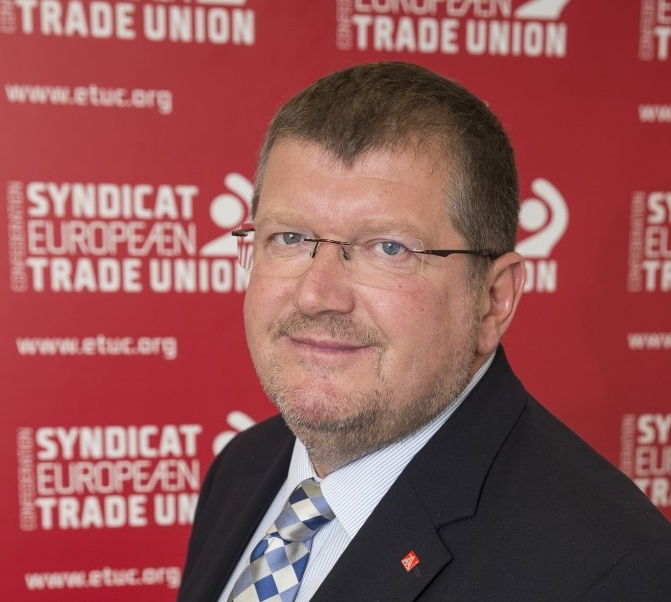I am the Deputy General Secretary of the European Trade Union Confederation (ETUC). I served an apprenticeship as a metal worker (since 1974 member of the IG Metall) and studied history and sociology in Berlin, Bielefeld and Newcastle-upon-Tyne. In the field of workers participation I served as a works council, a member of various supervisory boards (ThyssenKrupp, Opel, Vodafone) and I was more than three years with ArcelorMittal as a Labour Director and member of the management committee in a steel plant. From 2005-2011 I was General Secretary of the European Metalworkers Federation (EMF).
The participation of workers, both strategic and financial, has long been a central pillar in some European countries (Germany, Scandinavia, France) that have been able to enhance it as a strategic factor for economic competitiveness and social inclusion, thus distinguishing itself in the global scenario for industrial relations based on sharing stakeholders interest: is it possible to reinforce the culture of participation in Europe?
I am deeply convinced that it is possible to strengthen the workers’ participation in various forms and ways. Just take the example of France. Very recently in France a debate about workers participation and workers representation in boards took place. A new law, which is making it possible to have workers representatives in boards, was introduced a couple years ago. In the long run workers will not anymore accept that they have no or very little say in what determines the future of the company respectively their own future. Governments, Members of National and European Parliament and Politicians in general should note, that more democracy at work is contributing to a greater sense of ownership of workers and their representatives. This of course is positively contributing to the performance of a company and its workforce. At the same time more democracy at work is working as an antidote to the increasing disappointment of European citizens about their role in the industrial relations. Treated as an object which is forced to accept the consequences of management decisions and an unregulated global competition makes millions of workers looking for “cheap and populistic” solutions. We can easily see that when looking at the recent election results. A participative society should not be limited to public live, it should not stop at the factory gate. It is not by coincidence that the European countries with comparatively well-developed information, consultation and participation rights are doing economically better than the ones with a rather conflictive industrial relation system. This fact should make policy makers and legislators think.
What role institutions, employers’ associations and trade unions have to play?
Employers must give up their resistance against workers participation and should enable the biggest asset they have, their workforce, to have workers’ voice being heard and respected. The functioning of a social dialogue at the company level is the best recipe to avoid unnecessary industrial action and cooperation at shop floor level is always contributing to productivity. All this is in modern management methodology well known but far too many employers still behave in a rigid 19th century style of managing a company. The Trade Unions in countries where no or very weak participation rights exist (in 18 out of 28 countries we do have some sort of participation in management decisions) must find ways to participate through company based agreements. This is a very painstaking way and depends very much on the power trade unions can develop at the company level. The National and European legislator could change this way. We do need for European companies a clear and strong right for information, consultation and participation. We do need a good and solid European minimum level of these rights. The EU Commission is currently introducing a proposal for a company law which would make the merger, conversion and division of a company european-wide the same. Many countries have i.e. no provisions regarding divisions of a company. Similar to this, ten countries have no provision for participation. Obviously the Commission is not hesitating to “europeanise” company law but is not “europeanising” participation rights. It is simply politically not wanted by the Commission. This is clearly wrong and a big missed opportunity! Europeans have to see and feel in every day life (and where better could that take place as at the workplace) that we are constantly developing one of the the biggest value we have: Democracy!
ETUC presented recently the initiative “More democracy at work”, can you describe it to us?
With this initiative the ETUC wants to raise the awareness of policy makers, European works councils, researchers, trade unionists, employers, workers and citizens in general for the need of an improved and developed legal framework for democracy at the company level. In May next year the European electorate is asked to vote for the new Parliament. We want to ask the candidates to put on their agenda “More Democracy at Work”. We recommend workers to pay attention what their candidates have to offer when it comes to support a modern way of managing working life and industrial relations. With the initiative we want to influence the selection of the new EU Commission in the 2nd half of the next year. We want that more participations rights are on the agenda of the new Commission. For that we will have a series of European actions here in Brussels but at the same time our member organisation will run actions and events on the national level. We want to confront policy makers and deciders on various levels with our demand for more democratic rights at work.


 Follow
Follow